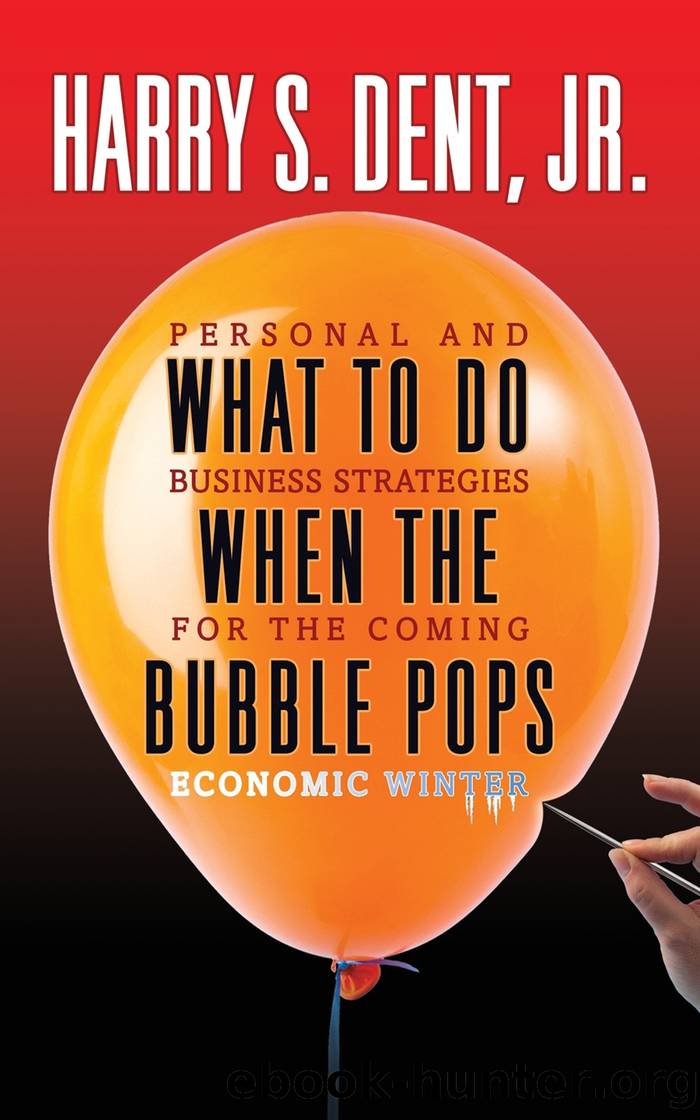What to Do When the Bubble Pops by Harry S. Dent Jr

Author:Harry S. Dent Jr.
Language: eng
Format: epub
Publisher: G&D Media
Published: 2020-08-15T00:00:00+00:00
Chapter Four
Bubble Wealth
There is another important thing to understand about what’s happening. Globally, when stocks go down, they all go down; some just go down faster and to different degrees. Real estate’s more like popcorn. The Japan bubble burst first, and everybody thought it was an anomaly. Then it burst in the United States, Spain, and then Ireland. People were still saying, “Those are anomalies. Our bubbles won’t burst.” But it’s like a popcorn popper. The more kernels burst, the faster the process accelerates.
In some leading cities, like London, New York, San Francisco, and Vancouver, the bubbles are insane. The last time I was in Vancouver, my taxi driver was living in a $1.1 million shack. I told him, “This is a glorified trailer. You should sell that thing while you can. This is crazy.”
When everyday people can’t afford to live in a place anymore, they start to riot. People in Vancouver are starting to protest. People in Singapore have already forced the government there to keep the Chinese from buying in order to stop speculation and penalize foreign buyers. As a result, real estate in Singapore is falling the fastest in Asia. San Francisco residents have been protesting foreign buyers, especially buyers from Silicon Valley. They hate Google, because executives come from around the world. These companies force up real-estate speculation, so everyday people have to move out of the city.
This is going to end. Not only is the China tsunami going to wreck the global economy, it’s going to set off a broader pop in real estate. None of these real-estate markets are ever going to be the same. Look for real estate to burst around the world at least as much as it burst back in 2006–12 in countries like the United States.
The hardest things to argue with people about are gold and real estate. I can talk people out of owning stocks and commodities, but people are personally attached to their real estate and to owning real estate in the first place.
We’ve been in a unique period of history since World War II, when, as I said earlier, the first middle-class generation could broadly afford homes. That caused an unbelievable boom in home buying from the fifties forward. Most baby boomers have lived in a time when real estate did nothing but go up, and we’re convinced it can never go down. That is the worst assumption you can make.
As I said before, during the last bubble, in 2000–06, banks went from loaning on a mortgage from three times your income to nine times, and incomes didn’t even go up that much. That’s what fueled the bubble. In addition to strong demand and demographics, it takes debt to fuel a bubble.
We have seen the greatest debt bubble in modern history. This occurs periodically, but only once in a lifetime, so nobody’s around to remember the last one. Our last great debt bubble occurred from 1914 into 1929—the Roaring Twenties. After causing a minor bubble in real estate and a big bubble in stocks, it crashed, and we had the Great Depression.
Download
This site does not store any files on its server. We only index and link to content provided by other sites. Please contact the content providers to delete copyright contents if any and email us, we'll remove relevant links or contents immediately.
| Budgeting & Money Management | College & Education Costs |
| Credit Ratings & Repair | Retirement Planning |
The Compound Effect by Darren Hardy(7562)
Tools of Titans by Timothy Ferriss(6950)
Nudge - Improving Decisions about Health, Wealth, and Happiness by Thaler Sunstein(6634)
Win Bigly by Scott Adams(6313)
Pioneering Portfolio Management by David F. Swensen(5606)
Deep Work by Cal Newport(5471)
Principles: Life and Work by Ray Dalio(5323)
The Barefoot Investor by Scott Pape(5310)
Rich Dad Poor Dad by Robert T. Kiyosaki(5150)
Grit by Angela Duckworth(4738)
The Slight Edge by Jeff Olson(4722)
Discipline Equals Freedom by Jocko Willink(4638)
Digital Minimalism by Cal Newport;(4545)
The Motivation Myth by Jeff Haden(4528)
You Are a Badass at Making Money by Jen Sincero(4254)
The Four Tendencies by Gretchen Rubin(4024)
The Confidence Code by Katty Kay(3567)
Eat That Frog! by Brian Tracy(3514)
Captivate by Vanessa Van Edwards(3298)
